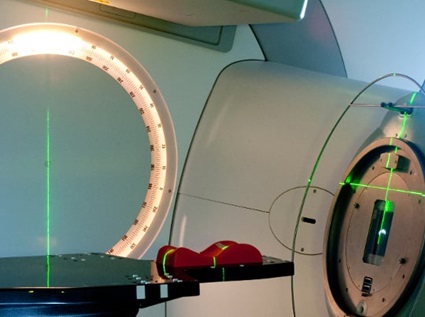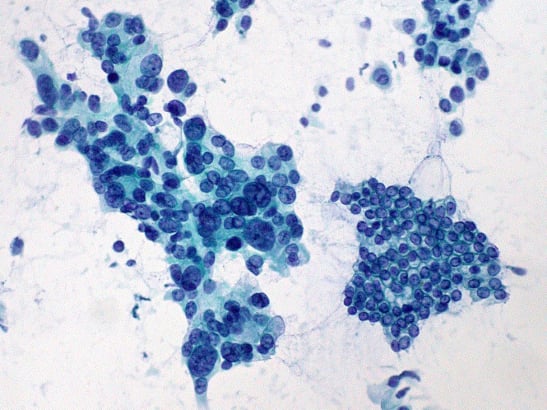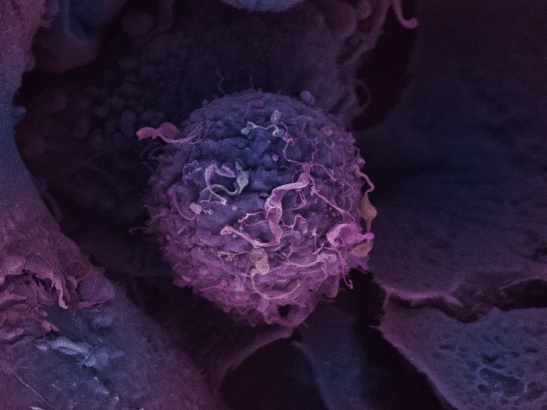Systems and Precision Cancer Medicine Group
Dr Anguraj Sadanandam’s Group is investigating methods to classify pancreatic-, colorectal-, breast- and multiple other cancer patients into clinically relevant subgroups.
Professor Anguraj Sadanandam
Group Leader:
Systems and Precision Cancer Medicine, Clinical Pharmacology & Trials
Professor Sadanandam applies the multidisciplinary experience both in the wet-lab and computational biology to identify and test personalised therapies for different cancer types.
Researchers in this group
Professor Anguraj Sadanandam's group have written 82 publications
Most recent new publication 12/2025
See all their publicationsResearch, projects and publications in this group
We systematically study tumour and immune/stromal heterogeneity by developing innovative artificial intelligence and machine-learning models to concurrently integrate multi-omics with phenome data.
Cancers are highly heterogeneous at molecular and phenotypic levels that it is essential to stratify these cancer patients for personalised cancer diagnosis and therapy.
To this end, my laboratory’s efforts build on our pioneering molecular stratification in different cancers including colorectal and pancreatic cancers. Nevertheless, we have specific projects in gastroesophageal, breast and pan-cancers (see high impact publications).
We systematically study tumour and immune/stromal heterogeneity by developing innovative artificial intelligence and machine-learning models to concurrently integrate multi-omics with phenome data. Multi-omics data include, but not limited to, image, transcriptome, genome and methylome. Phenome data include clinical outcomes and in vitro/in vivo data such as proliferation, migration, etc.
This careful, systematic approach of integration generates biomarkers and highly probable hypotheses for personalised cancer therapy.
Later, biomarkers are translated to potential molecular assays and tested in the clinic trial/study samples. Similarly, certain hypotheses are validated using mechanism-based pre-clinical cell line and mouse models and experiments.
This approach streamlines solutions to evolving areas in the field of multidisciplinary science including inter/intra-tumoural heterogeneity, companion diagnostic assay development, deconvolution statistical approaches, cell-of-origin/phenotypes-based evolution of tumour, and pre-clinical trials for modelling precision cancer therapy.
Translational cancer research and patient benefit
As a part of the ICR, my interdisciplinary (integrated experimental, computational and clinical biology) laboratory’s research focuses on translational cancer research and patient benefit and leverages national and international clinical trial and tissue resources. Our programme has three overlapping research themes:
1) defining clinically actionable inter/intra-tumoural heterogeneity by systematically integrating multi-omics profiles with phenome data;
2) developing prognostic and/or predictive biomarker-based companion diagnostic assays by dissecting tumour or drug-induced cancer heterogeneity; and
3) identifying and validating subtype-specific drug targets and therapies, specifically those involving immune/stroma pathways, for potential personalised/precision medicine.
Our research is deliberately interdisciplinary to maximise and expedite clinical translation and patient benefit.
Therefore, the existing group, along with clinical collaborators, has three key multidisciplinary components: basic/translational science (pre-clinical and mechanism-based experimental biology; and “Big” data generation); computational biology (development of artificial intelligence and machine learning tools and data analysis); and clinical science (companion diagnostics development; and collaboration-based clinical trial/study-relevant patient samples and data collection).
Our strategic national and international collaborations with industry, large consortia (such as the Colorectal Cancer Subtyping Consortium; CRCSC), leading clinicians across different continents and trial units, bioinformaticians, and biologists support and add value to my laboratory’s activities at the Institute of Cancer Research (ICR).
Furthermore, and focused on patient benefit, we have created an ICR-approved platform to make our companion diagnostic assays (patented already) available internationally for academic research purposes in collaboration.
Finally, we have developed novel bioinformatics and preclinical models, as resources, which are widely and internationally used. Moreover, our lab coordinates multiple cancer research projects related to Low and Middle Income Countries (LMIC) specifically related to India.
Our lab is exploring entrepreneurship through various resources for both Sadanandam and group members.
Overall, our groupscience-based research programme aligns well with the ICR/RMH Strategies, the UK’s and international key life sciences strategies, and developing a skilled workforce in interdisciplinary sciences including training clinicians/other disciplinarians in genomic pathology.
Integrated analysis of high-throughput molecular and metabolic profiles to develop pancreatic ductal adenocarcinoma subtype-specific therapy
Overall survival of pancreatic ductal adenocarcinoma (PDA) patients is less than 6 months from the time of diagnosis. Currently, patients with advanced or metastatic diseases are treated with gemicitabine, and have only a modest increase in survival. These attributes may reflect the variable and often disappointing responses seen when deploying therapeutic agents in unselected PDAC populations, despite occasional significant responses. Studies in other solid tumours have shown that heterogeneity in therapeutic responses can be anticipated by molecular differences between tumours, and targeting drugs specific to tumour subtypes in which they are predicted to be selectively effective can indeed improve treatment. Seeking to extend this new paradigm, we recently reported three gene expression subtypes of PDA named as classical, quasi-mesenchymal; QM-PDA and exocrine-like PDA using a gene expression signature (62 genes; designated as PDAssigner; Collisson and Sadanandam, et al. Nature Medicine, 2011; co-first author). Interestingly, patients with classical tumours fared better than patients with QM-PDA tumours after resection. We also observed that QM-PDA subtype cell lines are, on average, more sensitive to gemcitabine than the classical subtype lines. The opposite relationship is observed with erlotinib. Along this line, we are interested in characterising the distinct metabolic, genetic and cellular phenotypes of PDA subtypes and their influence on drug responses (precision and personalised medicine) involving wet-lab and bioinformatics by integrating high-throughput molecular and metabolic profiles and correlating the mixed signatures to that of the therapeutic responses.
Characterising colorectal cancer subtypes and integrated analysis of molecular profiles to identify precise therapies
Colorectal cancer (CRC) is a heterogeneous disease that is traditionally classified based on genomic (microsatellite, MSI; or chromosomal instability, CIN) or epigenomic (CpG island methylator phenotype, CIMP) status. In order to achieve a robust and clinically useful means of classification, we performed a novel combination of consensus-based unsupervised clustering of gene expression profiles from patient tumours (n > 1000) to find subtypes within these samples. In total, we identified five integrated CRC subtypes with differential gene expression signatures and prognosis. Namely, we predicted and validated the cellular origin of our subtypes and associated this and the drug responses in order to guide cellular signalling pathway- and mechanism based therapeutic strategies that target subtype-specific tumours. In addition, we also associated our subtypes with (i) MSI status, (ii) Wnt signaling pathway activity, (iii) metastasis to distant organs and (iv) response to targeted and chemotherapy (Sadanandam, et. al., Nature Medicine, 2013). The personalised response of the subtypes to targeted- or chemo-therapy were validated using cell lines in vitro and mouse (xenograft and genetically engineered; cross-species analysis) models in vivo. We will use systems biology approach to extend the characterisation of CRC subtypes in order to facilitate personalised medicine for this devastating disease. In addition, we are interested in understanding cetuximab- and anti-angiogenic therapeutic agents-based adaptive drug resistance in colorectal cancer.
Developing assays using gene signatures that distinguish different subtypes in the clinic
Assigning individual patients to different molecular subtypes require assays that can be used in the clinic. We have developed an exploratory RT-PCR and immunohistochemistry assays that distinguish different subtypes of CRC. Currently, we are interested in further improving these assays and also, developing novel assays involving nCounter platform (Nanostrings Technologies).
Characterising consensus tissue-independent molecular subtypes from different epithelial cancers
We have recently identified subtypes using multiple epithelial type cancers that are independent of tissue specific genes. These subtypes were found to have differential drug responses. We are interested in further characterising these subtypes.
We recommend widening your search to return results.
Industrial partnership opportunities with this group
Opportunity: Molecular subtyping and predictive test for personalising colorectal cancer
Commissioner: Professor Anguraj Sadanandam
 .
.


-547x410.tmb-hbmobile.jpg?Culture=en&sfvrsn=42342e99_2)
